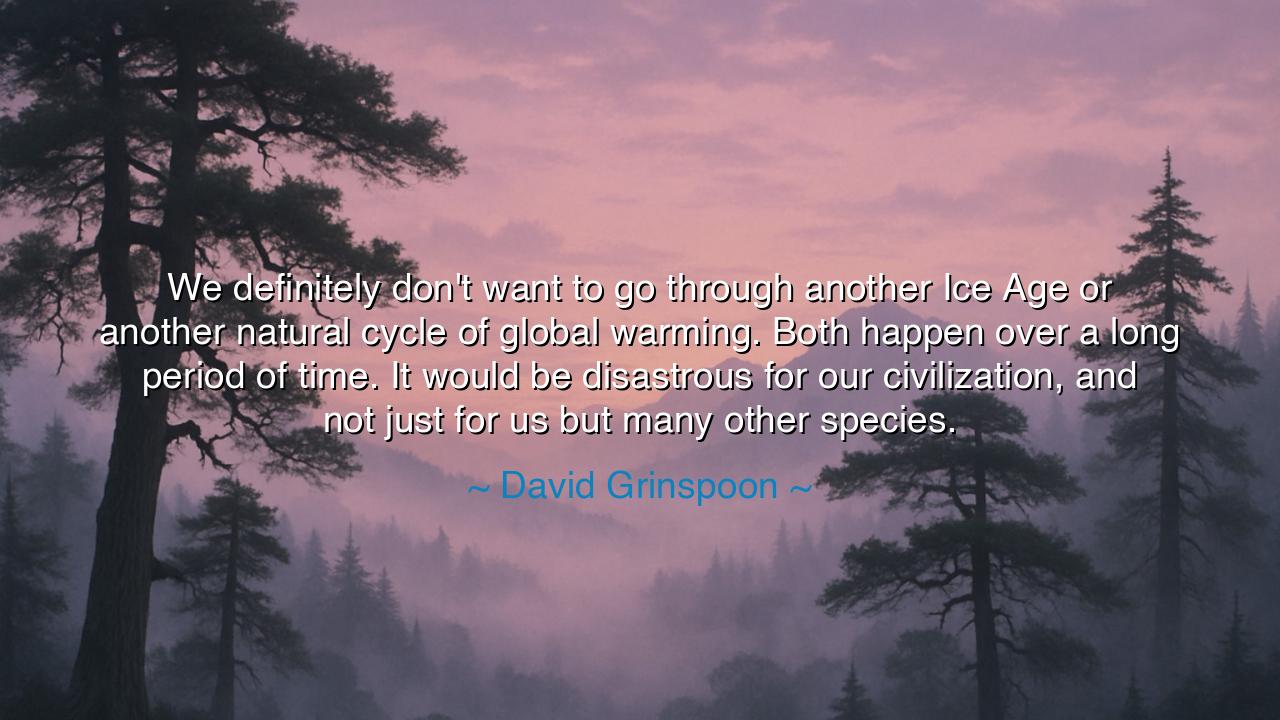
We definitely don't want to go through another Ice Age or another
We definitely don't want to go through another Ice Age or another natural cycle of global warming. Both happen over a long period of time. It would be disastrous for our civilization, and not just for us but many other species.






When David Grinspoon said, “We definitely don’t want to go through another Ice Age or another natural cycle of global warming. Both happen over a long period of time. It would be disastrous for our civilization, and not just for us but many other species,” he spoke with the voice of one who gazes not merely at the present, but across the vast corridors of cosmic time. His words are both warning and remembrance — a call to humility before the forces of nature that shaped us, and a plea for wisdom as we stand upon the precipice of our own making. The cycles he speaks of are ancient, older than memory itself: the great rhythms of Earth, where ice and fire take turns in sculpting the world. Yet his fear is not of nature’s past dominion — it is of what happens when humanity, in its pride, begins to hasten those rhythms by its own hand.
To understand his meaning, one must remember that the Ice Ages and global warmings of history were not brief moments, but epochs. They came like the slow breathing of the planet, shaping continents, creating and erasing species, humbling even the mightiest forms of life. When Grinspoon warns that another such cycle would be “disastrous,” he does not speak of mere inconvenience, but of civilization itself trembling before powers it cannot command. For our cities, our crops, our ways of living — all these depend upon the delicate balance of climate that has remained stable for only a few thousand years, a blink in the age of Earth. To disturb this harmony is to play dice with destiny itself.
And yet, what is most haunting in his words is not the grandeur of science, but the tenderness of his concern: “and not just for us but many other species.” Here speaks a voice of stewardship, not dominion. For the wise know that humanity is but one strand in the great web of life, and that when the web is torn, all suffer together. The extinction of a species, the loss of a forest, the melting of ice — these are not isolated tragedies but the unraveling of a tapestry woven through millions of years. Grinspoon’s vision is not narrow or national; it is planetary. He reminds us that our fate is intertwined with that of every creature that walks, swims, or flies beneath the sun.
The origin of this quote lies in Grinspoon’s lifelong study as an astrobiologist — a scientist who looks not only to Earth but to other worlds for insight. He has seen, through the eyes of data and discovery, how planets like Venus and Mars tell stories of lost balance. Venus, once perhaps temperate, was consumed by runaway warming, until its atmosphere became a furnace of carbon and flame. Mars, by contrast, lost its protective air and turned to ice and dust. Both are reminders that the climate of a world can change beyond recall — that even in the vast silence of space, nature can swing from abundance to desolation. And Grinspoon, gazing upon our fragile Earth, knows that we now stand between those two extremes, balancing upon the edge of knowledge and will.
In the annals of history, there are moments when humanity’s pride has brought ruin upon itself. Consider the tale of Easter Island, whose people, in pursuit of greatness, cut down every tree to raise their monuments. The soil eroded, the food vanished, and the civilization fell. They were undone not by malice, but by blindness — the same blindness that now tempts modern humankind, which burns forests and digs into the bones of the Earth for fuel, thinking the well will never run dry. Grinspoon’s words echo across centuries as both prophecy and prayer: that we must not repeat this folly on a planetary scale.
His warning, though, is not one of despair. It is an invitation to responsibility and foresight. If the natural cycles of warming and freezing unfold over millennia, then surely we, the thinking creatures of this age, can act within decades to preserve the balance. The ancients believed that wisdom lay in harmony — between man and nature, between desire and restraint. So too must we recover that ancient harmony. Technology, when guided by reverence, can heal as well as harm. To plant trees, to protect oceans, to choose renewable over destructive — these are not small acts, but the sacred duties of a species that has grown powerful enough to alter the stars of its own fate.
Thus, the lesson is clear: the Earth is both our inheritance and our responsibility. The cycles of ice and fire will come in their own time — but let them not be hastened by our greed or ignorance. The wise will live as stewards, not conquerors, remembering that the planet’s patience is vast but not infinite. And when we act with care — when we choose to guard rather than exploit — we fulfill the oldest law of all creation: that those who live in balance endure, while those who live in excess perish.
So remember this, children of the future: grace is given, but not guaranteed. The same Earth that nurtures us can abandon us if we forget her rhythms. Take heed of Grinspoon’s words, and let your civilization be one of reverence, not recklessness. For if we choose wisdom now, the song of humanity will continue — not drowned by fire or ice, but joined with the chorus of all living things, rising in harmony beneath an eternal and forgiving sky.






AAdministratorAdministrator
Welcome, honored guests. Please leave a comment, we will respond soon